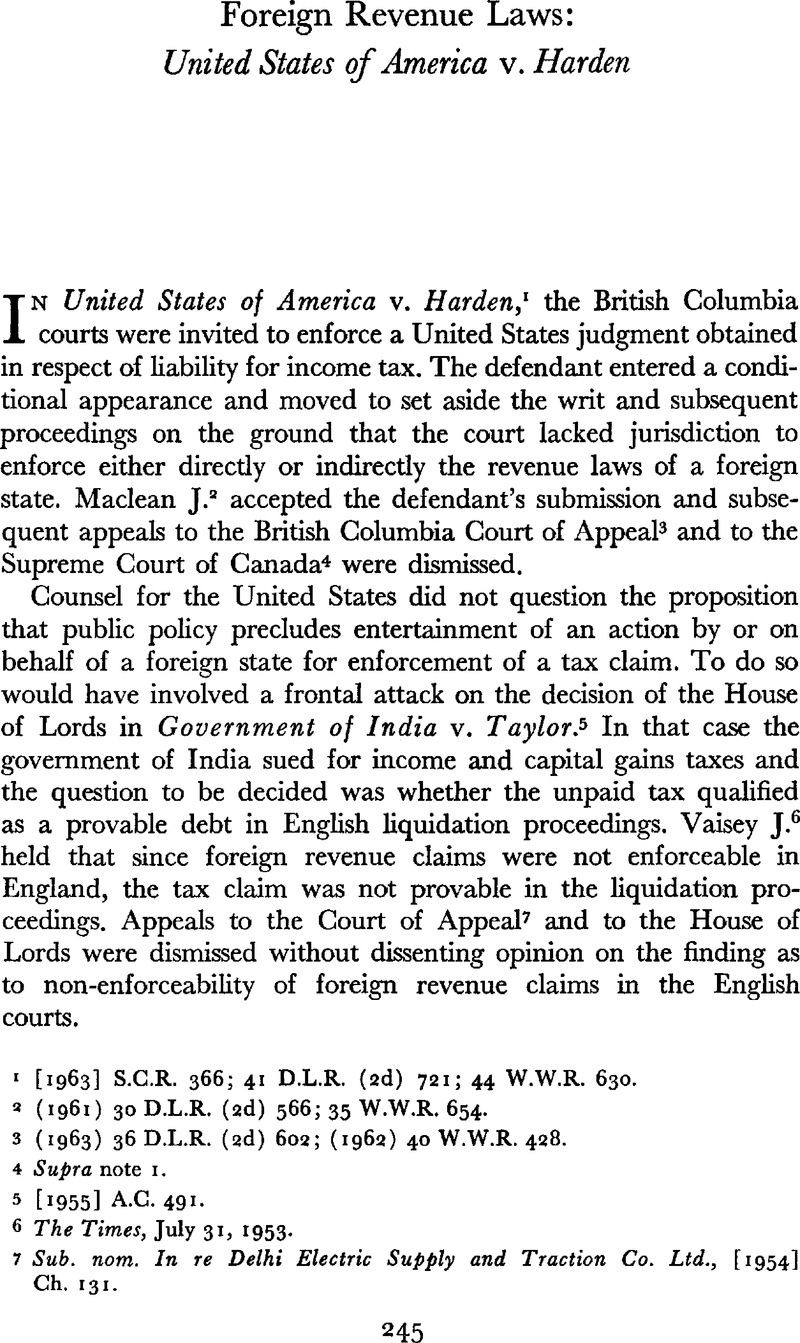No CrossRef data available.
Published online by Cambridge University Press: 09 March 2016

1 [1963] S.G.R. 366; 41 D.L.R. (2d) 721; 44 W.W.R. 630.
2 (1961) 30D.L.R. (2d) 566; 35 W.W.R. 654.
3 (1963) 36D.L.R. (2d) 602; (1962) 40 W.W.R. 428.
4 Supra note 1.
5 [1955] A.C. 491.
6 The Times, July 31, 1953.
7 Sub. nom. In re Delhi Electric Supply and Traction Co. Ltd., [1954] Ch. 131.
8 [1963] S.C.R. 366, 371; 41 D.L.R. (2d) 731, 725; 44 W.W.R. 630, 635.
9 See, for example, Read, Recognition and Enforcement of Foreign Judgments 120–121 (1938). There is no English authority in this century to support the rule, although there are a number of Canadian decisions.
10 See, for example, the Reciprocal Enforcement of Judgments Act, R.S.B.C. 1960, c. 331, s. 12.
11 [1955] A.C. 491, 514. (Italics added.)
12 In re Emery’s Investments Trusts, [1959] Ch. 410. This point receives further consideration infra.
13 In Dicey’s Conflict of Laws (7th ed. 1958), Rule 21 reads: “The court has no jurisdiction at common law to entertain an action — (I) for the enforcement, either directly or indirectly, of a penal, revenue, or other public law of a foreign State;…”
14 [1893] A.C. 150.
15 127 U.S. 265 (1888).
16 Ibid., 290–91.
17 A few months after the Privy Council’s judgment in Huntington v. Attrill, the United States Supreme Court was called upon to determine the same question between the same parties and came to the same conclusion: see Huntington v. Attrill, 146 U.S. 657 (1892). The appeal was from an action in Maryland based on the New York judgment and Mr. Justice Gray, delivering the judgment of the Supreme Court, took the opportunity to approve and quote from both his own judgment in Wisconsin v. Pelican Insurance and the aforementioned Privy Council decision.
18 Supra note 15.
19 296 U.S. 268 (1935)
20 U.S. Const, art. IV, s. I.
21 28 U.S.C, s. 1738 (1958).
22 See, for example, City of Detroit v. Gould, 146 N.E. 2d 61 (1957), where the authorities are collected.
23 City of Philadelphia v. Cohen, 184 N.E. 2d 167 (1962).
24 (1901) g S.L.T. 4.
25 [1955] A.C. 516 (reported as a note to Government of India v. Taylor).
26 Ibid., 529.
27 Ibid., 510–511.
28 See also Municipal Council of Sydney v. Bull, [1909] 1 K.B. 7; king of the Hellenes ν. Brostrom (1923), 16 LI. L. Rep. 190; Re Visser, The Queen of Holland v. Drukker, [1928] Ch. 877. The Sydney Municipal Council case was an attempt to recover local property taxes; the decision was followed in Ontario in City of Regina v. McVey (1922), 23 O.W.N. 32.
29 To undertake to show that the public policy of British Columbia is different in this respect would no doubt be a formidable task. However, some slight support for such a contention might have been drawn from a difference in the reciprocal enforcement statutes of the two jurisdictions. The B.C. Reciprocal Enforcement of Judgments Act, R.S.B.C. i960, c. 331, contains no express legislative recognition of the proposition that foreign tax judgments are non-enforceable, whereas in Gov’t, of India v. Taylor, Viscount Simonds could point to section i(2)(b) of the U.K. Foreign Judgments (Reciprocal Enforcement) Act, 1933, 23 Geo. 5, c. 13, which excludes from the provisions of the Act a judgment for “a sum payable in respect of taxes or other charges of a like nature or in respect of a fine or other penalty.”
30 (1775) ι Cowp. 341, 343.
31 See, for example, Ralli Brothers v. Compania Naviera Sota y Aznar, [1920] 2 K.B. 287, 300 (Scrutton L.J.); Foster v. Driscoll, [1929] ι K.B. 470, 518 (Sankey L.J.) ; Regazzoni v. K.C. Sethia (1944) Ltd., [1956] 2 Q.B. 490, 515 (Denning L.J.) and 524–525 (Parker L.J.).
32 See Gov’t, of India v. Taylor, supra note 5, at 505 (Viscount Simonds) and 514 (Lord Somervell); Regazzoni v. K.C. Sethia (1944) Ltd., [1958] A.C. 301, 322 (Viscount Simonds), 328 (Lord Keith), and 330 (Lord Somervell ).
33 Supra note 12.
34 Supra note 31.
35 Supra note 32.
36 Ibid., 330.
37 See supra note 11.
38 The Canadian government presently acts as collection agent for the income tax levied by all the provinces except Quebec.
39 Supra note 5, at 511.
40 Ibid., 514.
41 30 F. (2d) 600, 604 (1929). The same passage was quoted by Kingsmill Moore J. in the Peter Buchanan Ltd. case (supra note 25, at 528) and also appears in the judgment of the Supreme Court of Canada in Harden as part of an extract from the speech of Lord Keith.
42 Supra note 25, at 530.
43 Ibid., 529.
44 See supra note 5, at 507–508 (Viscount Simonds).
45 For authority against such enforcement, see City of Regina v. McVey, supra note 28.
46 S.Q. 1963, c. 63, S. I.
47 This would follow the pattern of existing reciprocal enforcement legislation in British Columbia. See Reciprocal Enforcement of Judgments Act, R.S.B.C. 1960, c. 331, and Reciprocal Enforcement of Maintenance Orders Act, R.S.B.C. 1960, c. 332.